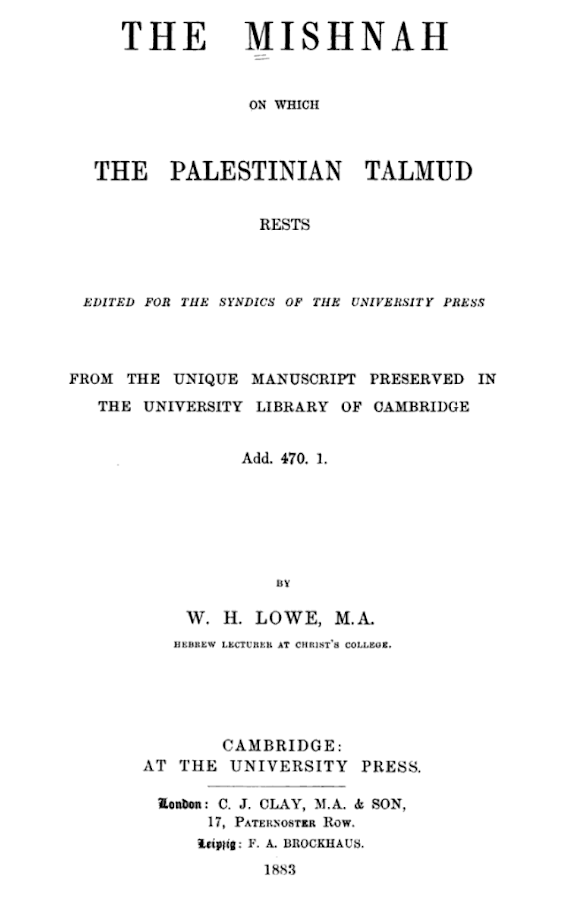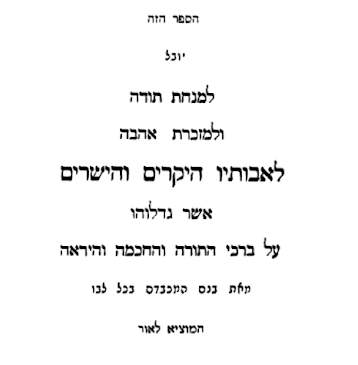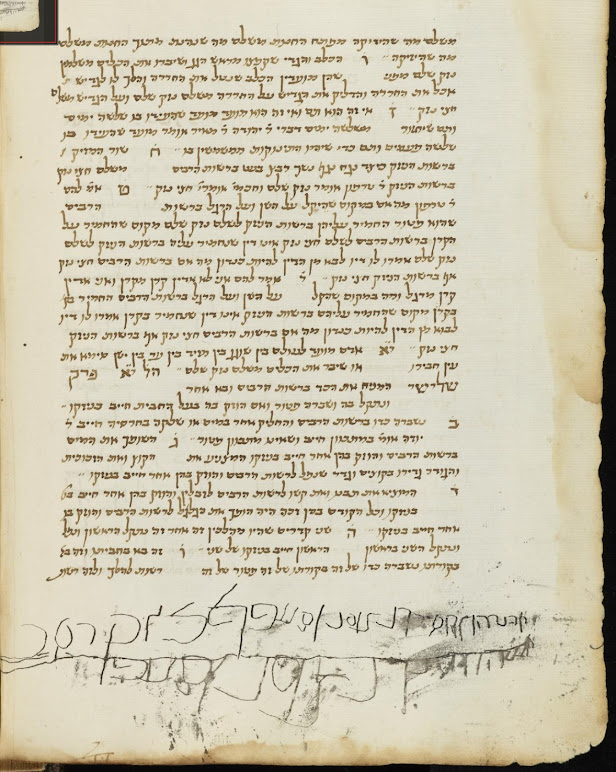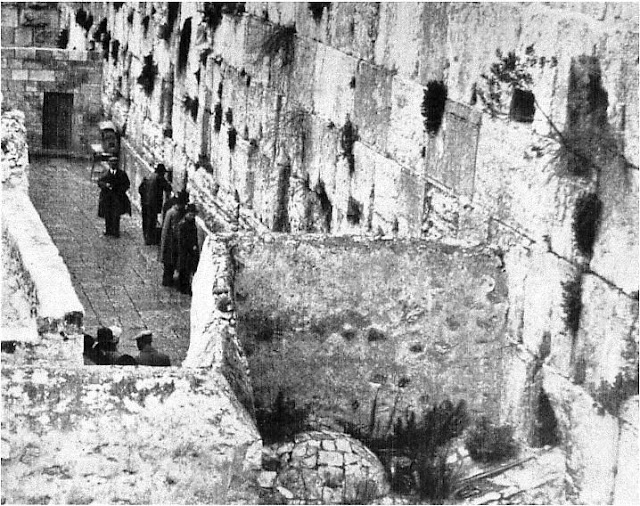Can
“The Whole World” Be Wrong? Lethal Journalism, Antisemitism, and Global Jihad
is a book that makes you shake your head a lot. You just can’t believe how
stupid people are. The stupid things they say and do to make themselves feel
better about themselves; the stupid things and the lies they say that allow
them to hate Jews and look the other way at the jihadists who target the liars,
their loved ones, and their way of life. It’s hard to watch—you want to look
away from this slow, global, own-goal suicide. But the author, Professor
Richard Landes, has made this work so compelling, you have no choice but to
continue reading, even when, as a sane person, it leaves you, the reader,
feeling rather queasy.
 |
Richard Landes
|
The book takes its title from the words of two men on the subject of blood libels, issued a
century apart. There are the mocking words of writer Ahad Ha’am (Asher
Ginsburg), who in 1897, echoing the oft-expressed sentiment by European non-Jews
when confronted with proof that, no. Jews don’t use the blood of Christian
babies in the manufacture of matzah: “Is it possible the whole world is wrong
and the Jews are right?”
 |
Ahad Ha'am (Asher Ginsburg)
|
In 2002, little more than 100 years later, UN Secretary
General Kofi Annan, referring to Israeli denials of a massacre in Jenin that
never occurred, said, “I don’t think the whole world, including the friends of the
Israeli people and government, can be wrong.”
In this way, antisemitism takes its path. Because there are
plenty of Jew-haters in the world. And the more there are, the more they give
themselves moral permission to hate. The media, of course, is there to help
things along with its own rendition of the modern blood libel. It’s called “lethal
journalism.” They use fake footage, knowing it’s fake. They lie, because the
lies are what their audiences want to hear. And they demonize Israel every
time, because again: it’s exactly what their audiences want to hear.
Landes takes you on a journey, beginning in 2000 with the Al
Durah hoax, moving on to 9-11, the phony Jenin “massacre,” and the Danish
cartoon scandal (Danoongate). At the end of each chapter, Landes summarizes the
stupid things that various figures have said in relation to these events. For
example, journalist Catherine Nay said of the faked viral photo of the dead boy
in his father’s arms, “This death erases, replaces the image of the boy in the
Warsaw Ghetto.”
Every bit as shockingly stupid are the words of George W.
Bush, spoken at the Islamic Center of Washington only days after 9-11, on
September 17, 2001, “Islam is peace.”
Regarding the fictional Jenin massacre, journalist Janine di
Giovanni wrote, “Rarely in more than a decade of war reporting from Bosnia,
Chechniya, Sierra Leone, Kossovo, have I seen such deliberate destruction, such
disrespect for human life," 'Inside the Camp of the Dead,' The Times, April 16, 2002.
And off Danoongate, the French Director of Intelligence speaking
in 2005, said, “These riots have nothing to do with Islam.”
Landes has been documenting this astounding stupidity and
world folly for more than a decade. The result is this 500-page compendium with
its prodigious, painstaking footnotes that leave the reader open-mouthed and
astonished. You wonder: “How on earth did we get here?”
But you already know. Landes has connected up all the dots:
the lies and lethal journalism, and the way the world gave jihad a pass, while
damning the Jews. The facts and the progression of this deadly state of affairs
have been amply covered by the author and you begin to understand the depth of
the threat to our world, today.
This a book you want on your shelf. It is not an easy read,
but a necessary one if you want to understand how we got here—and how we are to
dig our way out of this ugly, Jew-hating, jihadi, fake news mess. I put some
questions to author Richard Landes to learn more about his book and its
implications for the future:
Varda Epstein: Most
writers think about who they’re writing for and gear their writing to that
reader. “Can The ‘Whole World’ Be Wrong?” seems to be identifying who the
reader is not. The book begins with
a warning, but it’s more like a dare, or even a threat—like you’re trying to
scare the reader off: “If you feel up to the task . . . turn the page. If not,
just sit in your tub tweeting about white, racist privilege, while you bleed
out.”
Who do you envisage
as your reader? Who is it you’re trying to reach?
Richard Landes: My ideal reader is someone who really does
care about liberal and progressive values. I actually lay out my concerns in
the introductory chapter by contrasting zero-sum and positive-sum values, and
stating my unequivocal preference for the latter, while conceding that the
former has an inevitable presence in our lives and warning that those thinking
they can eliminate zero-sum are not only fooling themselves with messianic
dreams, but ultimately opposed to key life forces.
What I document in the book, however, is a massive shift in
what was considered “liberal” or “progressive” in the new century/millennium.
By 2003 it became a “litmus test of liberal credentials” to be pro-Palestinian
(Buruma in NYT), at a time when the Palestinians were engaged in a suicide-mass
murder war against Israeli civilians. By any standards of real liberal values
that was a travesty which continues to this day (think Gays and LGBTQ for
Palestine). So in a sense, the book is an attempt to go back to the moment this
travesty first “took” and rethink how it could have happened so quickly and
thoroughly. But since I firmly believe that the willingness to hear criticism
and take it seriously is one of the key components of the liberal sensibility,
I address this criticism to liberals sufficiently committed to their values to
take it seriously.
Varda Epstein: Do you
worry you’re preaching to the choir? Do you even aspire to reach the masses?
Richard Landes: Well that’s hard to say. Obviously a
500-page book with notes at the bottom of each page is not for “the masses.”
But, between masses and choir lies many a circle of readers. Obviously, the
“choir” of pro-Israel people are going to find it congenial. A number of people
have written me about devouring the book in one sitting and thanking me: “Someone
finally has the words for everything I’ve been struggling to say!” wrote one
person. And if it helps them make the point to others, that’s great. But my
real audience is what we might call the goats. As shepherds know, if you have
about one goat to every ten sheep, then when there’s a problem, the sheep look
to the goats. If they’re calm, the skittish sheep settle down. Similarly, I
don’t think I’m going to reach some gay guy so caught up in his peer group that
he repeats nonsense about being passionately for a political culture that hates
gays. But if I can reach the thoughtful ones, then maybe they can
explain it to him.
Varda Epstein: You
write, “In a sense, this book should not have had to be written and I should be
able to work on the origins of modern Western civilization in the demotic
millennialism of eleventh-century France to my heart’s content.” Why did the “Can
The ‘Whole World’ Be Wrong?” have to be written, and why by you, Richard
Landes? After all, as you suggest, lethal journalism, antisemitism, and global
jihad are not your chosen field.
Richard Landes: Well, actually, global jihad is my field since it’s an apocalyptic
millennial movement, and it came on my screen in the mid-90s through the (then)
graduate work of David
Cook (now at Rice U.). Actually, in the mid-1990s, in my work on the 11th
century, I began to work out a model of antisemitism that went in waves
starting with philo-semitism, leading to important socio-economic changes that
eventually produced an antisemitic reaction. Given that the period after the
Holocaust (i.e. my life) was the longest and most philo-semitic period in
recorded history (especially in the USA where I grew up), I speculated that the
advent of 2000 might mark the reappearance of antisemitism in the West. At the
time I thought it would come from the apocalyptic “right” – fundamentalist
Christian Zionists disappointed that the Rapture didn’t happen, and Jihadi
Muslims who were already openly and ferociously antisemitic. What I didn’t see
coming were two linked phenomena: 1) the attraction of the “Left” for the
Jihadi apocalyptic narrative that Israel and the US were “Satans”/Antichrists,
and 2) the utter failure of liberals, who had a huge presence in the public
sphere, to resist. As a result, what I thought would be a wave of Jew-hatred
that we could resist, has, over 20 years of astonishing and self-destructive
mishandling, become an existential threat not only to Israel (its purported
target) but to democracies around the world.
Why did I have to write it rather than someone else? I don’t
know. But someone else didn’t write it. It’s such a hard thing to grasp, a
history of your own time. Maybe working historians in the early 11th
century writing histories of the turn of that millennium made it a conceivable
project. Obviously I don’t write about everything (and neither did they). I
write in depth about what I think were errors of judgment on a civilizational
plane, which continue to be made by very smart people. We all love the story of
the emperor’s new clothes, but few of us want to entertain the notion that it’s
actually happening. Someone jokingly said that Amazon should bundle my book not
with another book, but with antidepressants. It’s dark stuff. Very depressing.
Without a deep sense of humor, I wouldn't have been able to keep my eye on this
ball over the course of decades.
Varda Epstein: How,
if at all, does your work as a medievalist inform your book, and in particular
your interest in eleventh-century France? Does your work on the al Durah story,
which you mention in your book, have anything to do with that? You cite many French
sources and drop French phrases in your book. I’m getting the idea that you’re
a Francophile—but not!
Richard Landes: As for the Middle Ages, there are three key
issues:
1)
Honor-shame societies: As a medievalist I
work on a society in which gaining/keeping honor and avoiding/revenging shame
were key components of public life, where it was legitimate, accepted, even
required that one shed blood for the sake of honor. Without understanding those
dynamics, you don’t understand Arab political culture. Now Edward Saïd made it
taboo to discuss these matters (the quintessence of “Orientalism”), and in
doing so blinded the West to the cultural dynamics of this region. In my book I
show how the Oslo Accords were based on thinking that Arafat and Arab political
culture were ready to give up the view that the very existence of Israel was so
shameful that it must be destroyed, and go for the positive-sum, win-win, of
“land for peace,” to the benefit of both the Israelis and the Palestinians. And
how ignoring those dynamics meant that right up to the last second, the peace
negotiators thought we were “sooo close.” And still do.
2)
Apocalyptic millenarian: the jihadis are
a classic expression of a distinctly (but not exclusively) medieval form of
eschatological thinking, namely they embrace an “active cataclysmic apocalyptic
scenario” – evil permeates the world and we are God’s agents in destroying it –
aiming at a hierarchical millennium – Islam will dominate the world, infidels
either accept dhimmitude (subjection), or convert, or die. It’s really hard for
moderns to take apocalyptic beliefs seriously because every time in the past
that people have been so moved, they’ve been wrong, sometimes disastrously so.
(This included modern historians of the Middle Ages.) As a result of this
cognitive lapse, and the pressures of political correctness in the 21st
century, to avoid anything too negative about Islam (don’t say “radical Islam”),
has produced a Western culture that cannot see its enemy (embodied in the
absurd formula “war on terrorism”).
3)
Public Secrets: for reasons that I’m not
sure about, both my academic career and my journalistic one have found and
investigated public secrets, that is, something everyone “in the know” knows
about, but when it comes to the public record, they deny any knowledge or
existence of the issue in question. In the Middle Ages it was about how
Charlemagne was crowned on the first day of the year 6000 from Creation – a
millennial date Christian chronographers had been tracking for over 6 centuries
– and yet no one who wrote about the coronation, or his imperial period,
mentioned it. In this book, the main public secret I deal with is that the
Palestinians fake news footage all the time, and that the press is so profoundly
intimidated by them, that they run Palestinian “lethal narratives” as news.
This unacknowledged, even denied phenomenon, has immense impact on the kind of
lethal journalism that we get constantly from our news media.
Varda Epstein: There’s
a lot about stupidity in your book—you call it when and where you see it, using
exactly that word “stupid” in its various forms. Why is it important to you to
use precisely this descriptor and how do you account for the sheer amount of it
that exists in the world?
Richard Landes: First because it’s a technical term in
economic and game theory for someone who hurts someone else without gaining any
advantage (Cipolla). Secondly because it’s so stunningly prominent in our
times. I define “astoundingly stupid” as creating advantages for an avowed
enemy. And as far as I can make out, that has been a consistent pattern among
the Western opinion leaders – journalists, academics, public intellectuals,
politicians, and policy makers – for the last two decades. As Elder of Ziyon
put it, my book is a “modern take on the Emperor’s New Clothes.” Then, when I
found the comment by Bonhoeffer
(which I included in the epigrams)—who also lived at a time when his society
was being seized by apocalyptic memes—about the impossibility of arguing with
precisely this kind of self-destructive stupidity, I knew I was on the right
track.
 |
| Dietrich Bonhoeffer |
Varda Epstein: How
did you decide on the structure of the book? How does the first part complement
the second? Why not have it in, say, two volumes? Oh, and you must tell us about
the haikus! That must have been fun.
Richard Landes: The
structure wrote itself. The first four chapters are my “history of my time,”
namely four incidents in the early aughts (‘00s) that chronicle key moments in
the assault of global jihad on western democracies, and the astoundingly stupid
way in which the West processed what was happening to them: the outbreak of the
intifada and the al Durah affair; 9-11; the “Jenin Massacre”; and the Danish
cartoon scandal.
Then, to explain how
this could happen, I went through the key players: 1) Shame-Honor driven Arab
culture; 2) Apocalyptic-Millennial driven Jihadi beliefs – what I call
Caliphators; 3) Liberal Cognitive Egocentrics: people who project their
positive-sum values onto cultures that don’t share it; 4) radical progressives
who, blinded by Saïd’s assault on Orientalism, end up allying with the most
imperialist movement in the world because it’s “anti-imperialist,” i.e.
anti-USA and Israel; 5) the lethal journalists who radically disorient their audiences
with their Palestinian-compliant “news” reports; and 6) the virtue-signaling Jews
who adopt their enemy’s narrative (something an apocalyptic Caliphator
predicted in 2001), thereby giving wings to the very kind of exterminationist
antisemitism that fueled the Nazi madness.
The last part
sketches developments over the next decade and a half (mid-aughts to now),
identifying some of the phenomena so striking in our current culture that I
think this turn-of-the-millennium seizure helped set in motion – woke,
cancel-culture politics, fake news, anti-racism discourse, and what I call
pre-emptive dhimmitude, namely the adoption by our information elites of a
posture of subjection to Muslim demands for respect which ends up attacking not
the invaders of democratic culture, but those (like me) who warn and mobilize
against those enemies.
As for the haikus,
I’ve been writing them ever since I ran across the form in my youth. The one
for al Durah (chapter one) was originally written for Y2K: “We need not have been/
Mouths open inhaling, when/ The sh*t hit the fan.” My favorite is the one for
the chapter on Jews against themselves: “Have ever before/ lambs denounced
lambs who refuse/ to lie with lions?”
Varda Epstein: I so
appreciated all the detailed footnotes you included at the bottom of each page
(I hate it when writers put them the end and I have to flip back and forth).
But that would have been a daunting task! You must have been taking voluminous
notes for years on end, as you read, watched, talked . . . does that about sum
it up? How many years was this book in the making?
 |
"A book that keeps writing itself,"
Tat Aluf Yossi Kuperwasser
|
Richard Landes: Yes, it does sum it up nicely. Thanks to Evernote (I have over 35,000 notes clipped
there), I’ve been able to preserve access to articles that no longer can be
found online. I’m ashamed to say the book was over a decade in the making. The
working title – They’re so smart, cause we’re so Stupid – was inspired
by the Fort Hood Massacre (2009) in which a Palestinian-American major in the
army, after extensively displaying his jihadi sympathies, shot dozens of his
fellow-soldiers, and inspired Mark Steyn
to write an article entitled: “These days, it’s easier to be even more stupid
after the event.” It’s just hard to write a history book about your own time. As
Yossi
Kuperwasser put it, “It’s a book that keeps writing itself.” When Shireen
abu Akleh was killed, I knew I couldn't include this ongoing, slow-motion
train wreck.
As for the footnotes, I feel passionately about a) having
many, and b) at the bottom of the page. I took out all the URLs one can find
for oneself easily from the hard-copy book, but for those who want to get them,
I have them up at my personal webpage for the book: https://richard-landes.com/the-whole-world/.
Varda Epstein: There
are so many shocking parts in your book still rattling around in my head. For
instance, that remark from a peer, “Well, the Jews have been asking for it, and
now, thank God, we can say what we think at last.”
Richard Landes: For
me it will always be Charles Enderlin, when I pointed out how much faking was
going on at Netzarim Junction the day Muhammad al Durah was allegedly shot,
saying to me “Oh yes, they do that all the time.”
But the two worst
comments by far were a) when a colleague in the history department responded to
my bemoaning the suicide terror war of the Palestinians with the comment, “What
choice do they have?” and b) the journalist Catherine Nay saying that the image
of al Durah “erased, replaced” the picture of the boy in the Warsaw Ghetto.
Hard to get more empirically and morally disoriented, and yet people heard
these kinds of remarks and nodded knowingly.
What would you say
shocked you most about your findings? I’m guessing it’s the stupidity. . .
Richard Landes: That’s one way to put it. Cowardice is
another. The way I’d put it, in the
‘90s, I may have seen a wave of antisemitism coming in 2000, and even a wave of
Jihadi attacks on the West, but I never dreamed that Western democracies would
be so feckless in responding.
Varda Epstein: What
do you want the reader to take away from your book?
Richard Landes:
1) that when “the
whole world” agrees on something (whether it’s the emperor’s courtiers or the
academics and journalists and pundits who think they speak for “the whole world” and are sure they’re right) they can (and have, and are and will) be, sometimes, wrong.
2) that the meanings of “liberal” and “progressive”
have been terribly distorted, even
betrayed, in the 21st century.
3) that when the
legacy media reports Israel has done something terrible and Israeli sources
deny it (or even admit to it only partially) it’s possible that the legacy
media is wrong.
4) that we’ve gotten
into this mess because a lot of nice and well-intentioned people have allowed
themselves to be pushed around, silenced, and cowed by those filled with
passionate intensity, and we need to speak up.
5) that to continue
down this path spells disaster.
***
Landes, R. (2022). Can “The Whole World” Be Wrong?: Lethal Journalism, Antisemitism, and Global Jihad (Antisemitism in America). Boston : Academic Studies Press, 2022.
(available on
Amazon.)
|
 Buy the EoZ book, PROTOCOLS: Exposing Modern Antisemitism today at Amazon! Buy the EoZ book, PROTOCOLS: Exposing Modern Antisemitism today at Amazon!
Or order from your favorite bookseller, using ISBN 9798985708424.
Read all about it here!
|

|
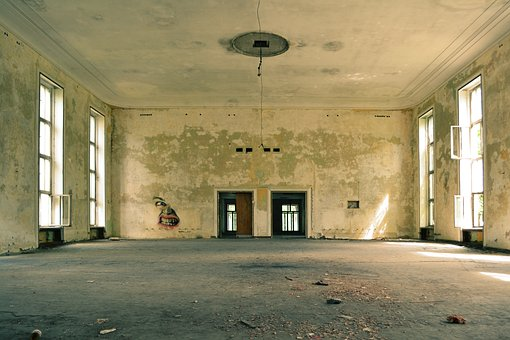 Ramallah, March 23 - Staff at an institution dedicated to displaying indigenous artifacts of the Arab people of this part of the Levant struggled again today to articulate the difference in tone the exhibits take toward two different periods in which a colonizing foreign entity swept through the land and imposed hegemony on its inhabitants, with periods prior to the seventh century and after the nineteenth portrayed in frightful terms, while those in between are characterized in neutral, benign, or glorious terms, a discrepancy that curators and docents have grappled with unsuccessfully since the venue opened to guests several years ago.
Ramallah, March 23 - Staff at an institution dedicated to displaying indigenous artifacts of the Arab people of this part of the Levant struggled again today to articulate the difference in tone the exhibits take toward two different periods in which a colonizing foreign entity swept through the land and imposed hegemony on its inhabitants, with periods prior to the seventh century and after the nineteenth portrayed in frightful terms, while those in between are characterized in neutral, benign, or glorious terms, a discrepancy that curators and docents have grappled with unsuccessfully since the venue opened to guests several years ago.

 Elder of Ziyon
Elder of Ziyon





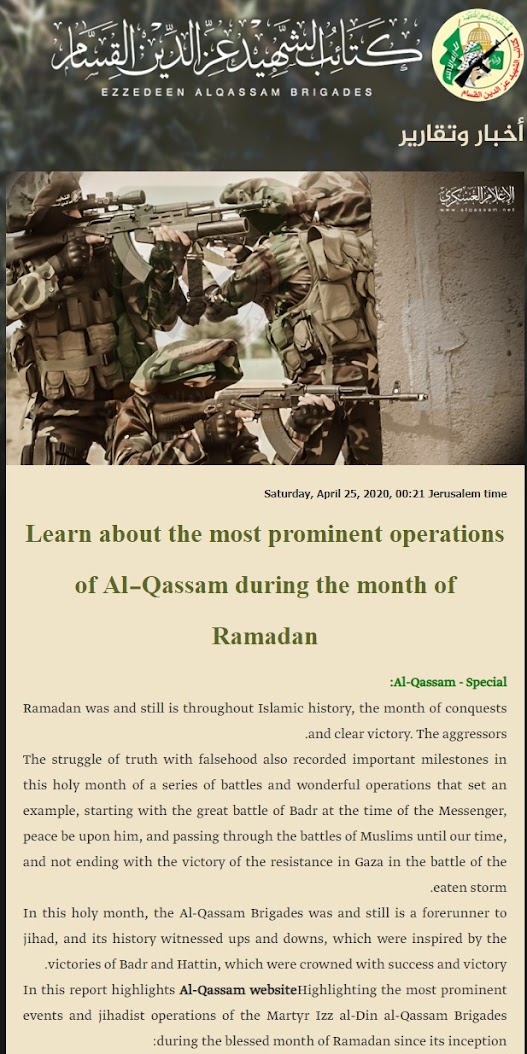

.jpeg)




